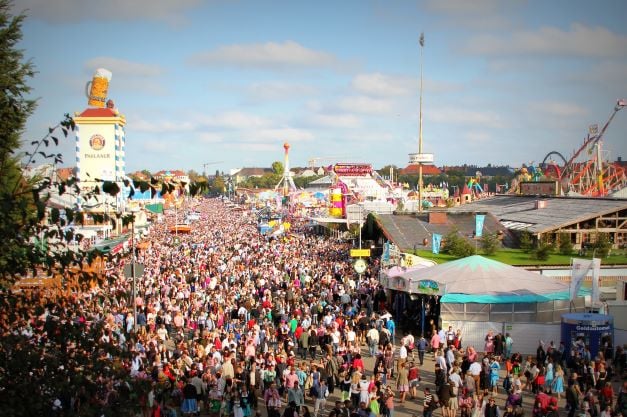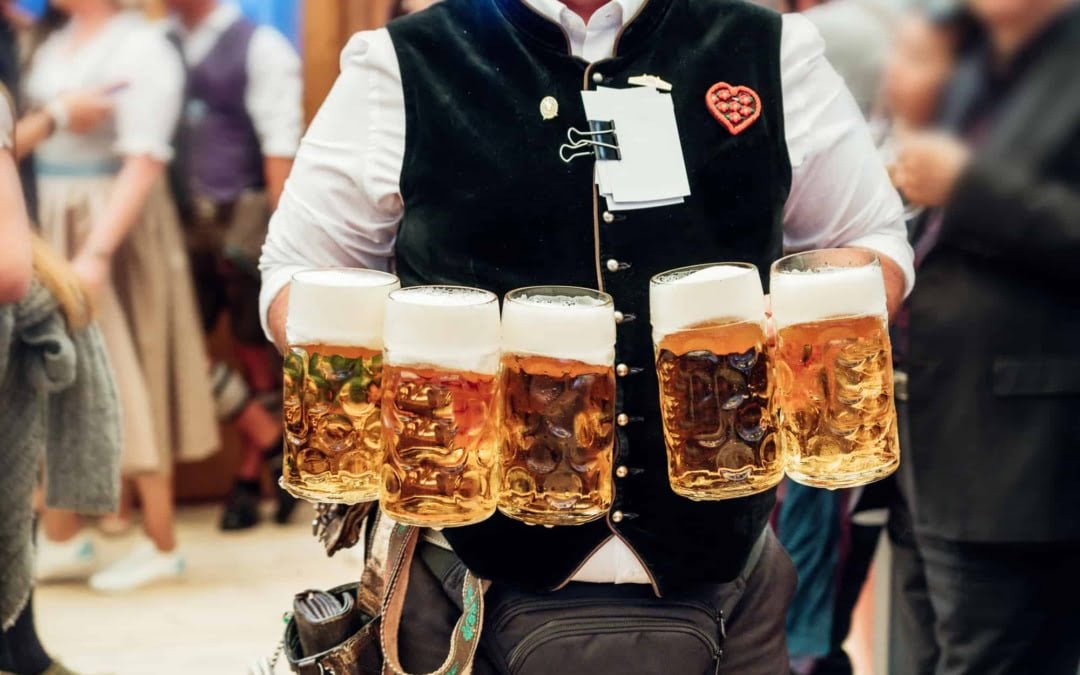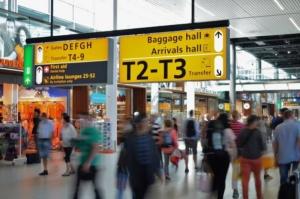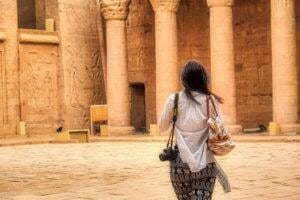Nowadays, it is safe to assume that most people have heard of Oktoberfest. As you might have guessed, this German beer festival takes place once a year. Oktoberfest originated in Munich but today we can find similar celebrations throughout Germany and even around the world. There is even an Oktoberfest celebration in our hometown where there is a large German population including Kati. Is it good? Not really. We have gone a couple of times but quit going a few years ago.
The official Oktoberfest is held on Theresienwiese Square (Wiese = meadow) in Munich. Contrary to what its name indicates, it does not begin in October but in September (more precisely on September 17, this year) and lasts until the first weekend of October. This year, October 3 (which is National Day of Germany) falls on a Monday, adding a day of celebration to this closing weekend.
Oktoberfest does have a historical past and traditions, without which Munich would not be the same. This article will answer your questions and give you an overview of the annual Oktoberfest, what to do there, and everything you can find there.
Oktoberfest, What is it?
Oktoberfest is a festival that takes place in Munich every year. Generally, it lasts two weeks and it was on October 12, 1810, that the first edition took place. The festival ended five days later at the Theresienwiese, with a hair race.
A few years later, during the 20th century, this festival became an agricultural fair before breweries and small restaurants were established. Today, the mayor of Munich opens the festival by tapping the first cask. The Oktoberfest attracts over six million people each year, many of them tourists.
Today, men and women wear traditional Bavarian clothing. The women wear Dirndl, a colorful dress on a white blouse. The men wear Lederhosen, a type of capri pants/shorts with suspenders, and a white shirt.
What Do We Do at Oktoberfest?
As tradition dictates, Oktoberfest begins on the next to last Saturday of the month at noon sharp, when the mayor of Munich opens the first keg of beer, shouting “O’zapft is” (the Bavarian pronunciation of “angezapft ist es”, which announces that the first keg is open, and the beer can begin to flow). Theresienwiese Square (also called “Festwiese”, the party square) is filled with tents erected during the summer, held by different breweries offering six local beers. Some of them are prohibited for minors, so remember to find out before you go! In addition to the beer, these tents each have their own decoration, their spirit, and also their popularity. We can, therefore, only recommend that you choose the tent according to your tastes: Do you prefer to be surrounded by a crowd, or in a quiet place? Do you have the patience to wait to be seated?
The question of what to do at Oktoberfest almost automatically leads to the answer “drink beer!”. Indeed, as its name suggests, there is a lot of beer. They are usually served in 1-litre glasses (called “Maß”) and tradition dictates that you always tip the waiters, at the risk of appearing very rude. The waitresses usually wear the traditional Bavarian attire known as a “Dirndl” and are known to be able to carry more beers than you can drink without fainting. There are, of course, non-alcoholic drinks and wine in the “Weinzelt” (the wine tent), although it is a bit shameful to be seen drinking wine at Oktoberfest.
It is also essential to add that there is more to Oktoberfest than just drinking beer: This remarkable party is first and foremost a human gathering. People sing and dance together, sometimes even on the benches. There is a carnival, parades, and small shops where you can buy your partner a “Lebkuchenherz”, the famous heart-shaped gingerbread.

With 6 million people going to Oktoberfest, get ready for the crowds.
How Much Should You Budget For Oktoberfest?
The budget for your stay at Oktoberfest depends mainly on what you are willing to eat and drink. The good news is that entry to Oktoberfest is and always has been 100% free. Regarding the price of drinks, a liter of beer is around 12 euros. It takes a little less for non-alcoholic drinks.
What Do We Eat at Oktoberfest?
The Oktoberfest is also an opportunity to discover Bavarian culinary specialties. Among them, we can find Brezn (large pretzels), Haxn (smoked ham), Obazda (a Bavarian cheese), and Hendl (roasted chicken), among many others. Some tents open their doors an hour before serving beer and allow you to bring your own breakfast. Be careful though, recent security standards no longer allow bringing too big bags to Oktoberfest.
But back to what we drink at Oktoberfest. As mentioned earlier, there are six different beers. And because they each have their own taste and percentage of alcohol; our best advice is to try them all! Remember to remember the word “Prost!” (Health!) to be able to toast with those around you. And if you’re feeling adventurous, you can also add your voice to the traditional chant: “Oans, zwoa, gsuffa!” (To the one, to the two, let’s drink!)
Where to Sleep in Munich during Oktoberfest?
Munich is a very expensive city in terms of hotels and accommodation of all types, including hostels, even outside of Oktoberfest. If your budget does not allow you to go to the hotel (up to 1000€ per night!!!), consider renting an apartment, in bed and breakfast or in a boarding house, a small family establishment offering breakfast and sometimes meals. Youth hostels and camping in Munich will be less expensive if you do not care about comfort.
Campsites including tent, sleeping bag, breakfast and unlimited beer are the most economical solution (around €75/night, €150 for three days), but require you to accept approximately 2 hours of travel to the Wiesn. If hotels are prohibitive on weekends, last-minute prices during the week on sites like Booking can be attractive (around €100) and even cheaper than apartments or guest rooms rented in advance. Sometimes it makes more sense to wait for those last-minute deals than to book weeks in advance when prices are very high!
But beware. Heading to one of the world’s most famous festivals can be VERY expensive as far as accommodations and the closer you are to the actual celebration the more you will pay.
Our Final Word
So, are you ready to put on your Lederhosen or Dirndl and head to Munich to have some traditional German food and lots and lots of beer? Oktoberfest is on many travelers’ bucket list. But beware. During Oktoberfest, the city gets packed and there are drunk people everywhere. All the drunken antics often lead to fights and what the Germans call bierleichen, or “beer corpses”. These are people that have had so much to drink that they are passed out drunk behind the tents. So, If you can put up with that and the immense crowds it is totally worth going and experiencing one of the world’s greatest festivals.
Related Posts
5 Simple Ways to Celebrate Earth Day and Make a Positive Impact
Earth Day, celebrated annually on April 22nd, is a global event that aims to raise awareness about environmental issues and promote sustainable practices. It serves as a reminder of our responsibility to protect and preserve the planet for future generations. Earth Day was first observed in 1970 and has since grown into a worldwide movement, with millions of people participating in various activities to make a positive impact on the environment.
Sun, Sand, and Adventure: Top 5 Things to Experience on Fort Myers Beach
Fort Myers Beach offers a paradise for sun-seekers and adventure enthusiasts alike. Dive into crystal-clear waters teeming with vibrant marine life, or soak up the sun on the pristine sandy shores. Embark on thrilling water sports, explore the enchanting Lovers Key State Park, or indulge in fresh seafood at waterfront restaurants.
Birding Paradise: Discovering the Ultimate Countries for Birdwatching Enthusiasts
Birding Paradise takes you on a captivating journey to the ultimate countries for birdwatching enthusiasts. From the lush rainforests of Costa Rica to the vast plains of Kenya, this article unveils the most breathtaking birding destinations on Earth. Packed with stunning photographs and expert tips, it is a must-have guide for every avid birder.










0 Comments